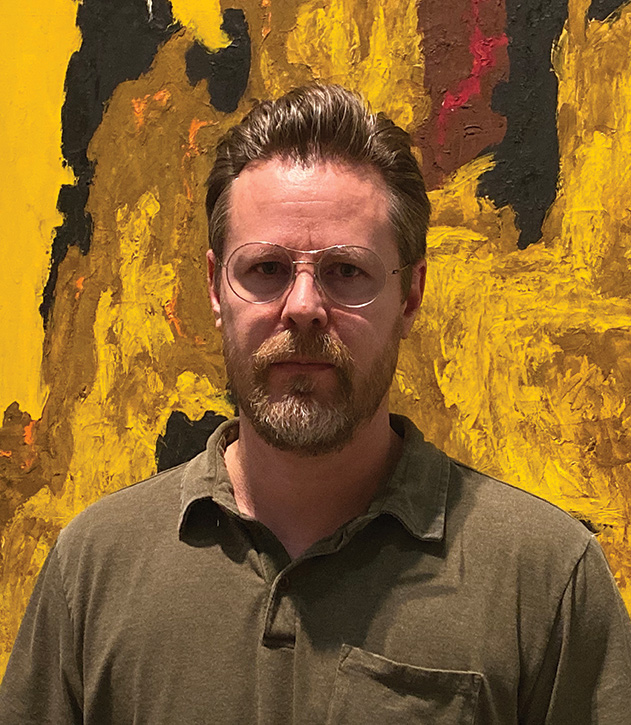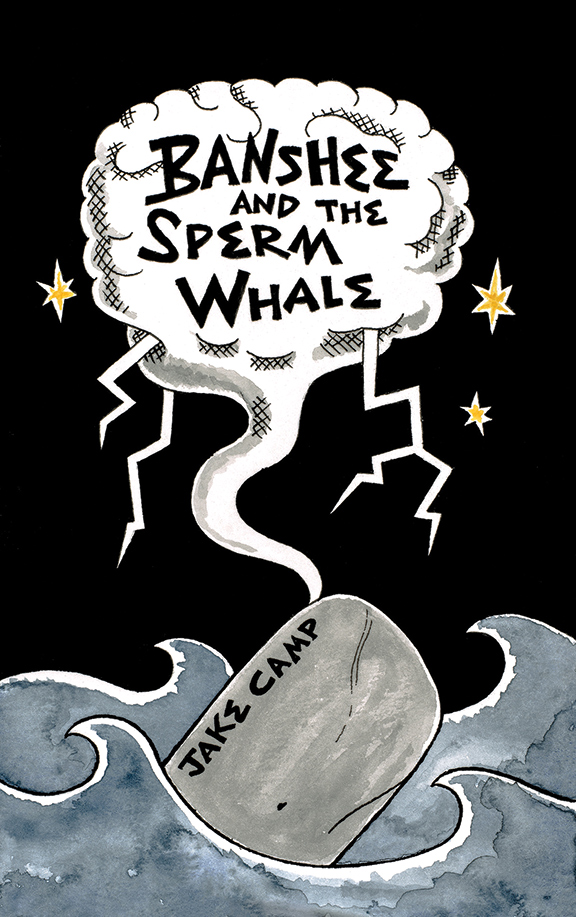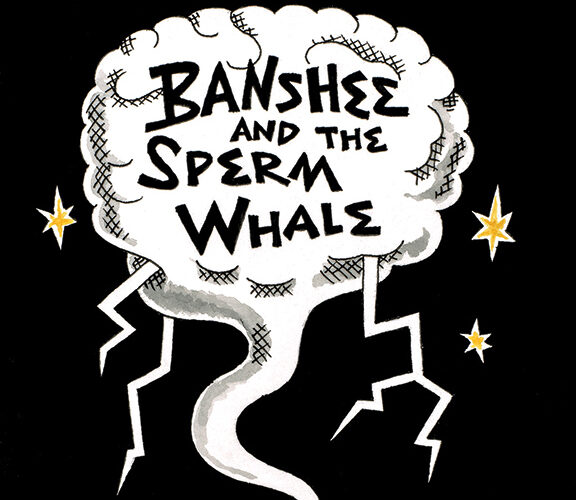BY SAM DESTEFANO
“A sunset wedding in Kona. An ugly secret discovered on an iPhone. Experimental phil-osophical marriage counseling. Time travel. Diver Neurons and Angel Neurons separated by Sea and Sky. Banshee and the Sperm Whale takes the reader on a journey into the unconscious mind of Martin, a biracial chef from Denver who suffers from a particular kind of overabundance. Along the way, a modern allegory unfolds, and everyday notions about self-knowledge, the nature of good and evil, and possibility of finding meaning and spiritual significance in the face of inexorable uncertainty are turned inside out.”
The novel’s cover description only begins to give us a taste of this extraordinarily imaginative, fun and deeply philosophical novel from one of our best local novelists Jake Camp. We were honored to sit down with Jake to discuss his work.
Can you tell us about your history as a writer?
So, the first fictional story I remember writing was in the second grade. It was about a character named Dog. You know, like Dog the Bounty Hunter, except “Dog” was actually a dog who could talk and reason and such. Dog was going through some struggles. He had a mean parent and whatnot. Society was not on his side. Later, Dog realized his name was “God” spelled backward and saved the world based on the strength of this realization.
After the Dog story, I didn’t pick back up with fiction until I was 37 years old. Not sure what the deal was there. Maybe I lost confidence or couldn’t find my voice. Maybe I fell down the academic-philosophy wormhole. It happens. At any rate, after enduring a few low-paying, thankless or otherwise shitty jobs (I’ll hold off on naming employers), I decided to give fiction another go.
Six years later, Facticity Blues was born! Four years after that, Facticity’s rugged seafaring sister, Banshee and the Sperm Whale, came into the world! Along the way, I published a few short stories and essays here and there, a few of which are on my website: www.jakecamp.com
 How did you decide to embark on the journey of exploring this story? Is there anything autobiographical here? What compelled you to take on this subject matter?
How did you decide to embark on the journey of exploring this story? Is there anything autobiographical here? What compelled you to take on this subject matter?
First off, Banshee is not autobiographical. I don’t suffer from hypersexuality, for example. I’m not a chef. I’ve never lived in Seattle. However, I do have some things in common with the protagonist, Martin. Both of us like Shabazz Palaces and Pokey LaFarge. Both of us feel a deep need for art in our lives. Both experienced marital problems. In Martin’s case, it was separation. In my case, divorce.
So, yeah, I had a lot of dangly, unprocessed feelings during the writing process. I really didn’t like how my marriage ended. Not that it was necessarily bad that it did end. But, again, it was the how that really bothered me. My ex and I didn’t process what went wrong in our relationship. There was minimal soul-searching. We barely saw a counselor. The divorce was sudden. I felt shell-shocked and frozen.
Banshee helped me thaw out. I sort of said to myself, hey, let’s approach my situation counterfactually and write a story about a couple who were taking the right steps. Let’s channel some post-divorce blues into a robust counseling session—with an experimental philosophical counselor steeped in avant-garde jazz! Along the way, let’s uncork a little dark humor, unload some meta-angst. Don’t worry about audience. Just write the kind of novel I’d like to read. And so, I did.
The house of Banshee and the Sperm Whale is built on so many different dualities. God vs. desire, the id vs. the ego, spirituality vs. religion, repression vs. expression, the unconscious vs. reality etc. all stand, side-by-side, as foundational pillars, but are also constantly at odds with each other. Do you feel that by the end of the novel the characters have to some extent sorted these ideas out? What do you hope your readers will gain from contemplating these dualities?
Tough questions. In terms of the dualities, I do think that the characters sort out quite a bit. Each character grows in one way or another. The growth is interconnected—Chuck’s character arc affects Desmond’s, etc. Though I don’t believe we land in ultimate answers. Or, perhaps I should say that the characters don’t land in ultimate answers, or none that they are aware of. But, since this is fiction, and since fiction allows for a God’s eye view, readers are able to see resolution in places where characters are not.
For example, consider one of the explorers in the novel, Nate. Nate believes he is doing something powerful, something necessary. However, his motivations are irrational in a way. Much like an extreme mountaineer, he is compelled to take chances, live dangerously. Yes, he has faith that he won’t die, but not religious faith. It’s more like spirituality or a higher calling. Nate doesn’t understand this, though readers do…to a degree.
To clarify, Banshee has a distinct plot and is understandable on the whole. This isn’t a full-blown postmodern novel—a reader can put together the pieces. Though l’d also say that I don’t necessarily care if readers grasp all my writerly intentions. I value subjective interpretations. It would be gratifying to learn that Banshee yields wildly divergent reading experiences.
 My father always would tell me that “nature is unforgiving,” which was his way of saying that you have to rise above the circumstances. Banshee and the Sperm Whale’s barometer is set by the weather, nature and the mysteries of the sea that, to me, strike a similar chord. Why is this such an important part of this novel?
My father always would tell me that “nature is unforgiving,” which was his way of saying that you have to rise above the circumstances. Banshee and the Sperm Whale’s barometer is set by the weather, nature and the mysteries of the sea that, to me, strike a similar chord. Why is this such an important part of this novel?
Hmmm, let me crack open a beer…
So when I start thinking about metaphors for understanding the psyche, and when we look at the imagery in the art world, dating back thousands of years, nature is ever present. Endless skies. Clouds that spiral and dance in all directions. Wild animals. Powerful weather patterns. Fire. Caves. A sea whose depths is unknown and that covers most of our planet.
In this way, nature is inescapable, ever present—and to your father’s point, Sam— unforgiving. There are challenges to overcome. We are bound by winds and rain and sun. We are nature. Its mysteries are our mysteries, including the most complicated natural object in the known universe, the human brain, whose activities are 95% unconscious.
The other things I’d gesture toward are the traditional metaphors for framing metaphysical unknowns. So, like, Heaven and Hell. People point to the sky and think Heaven. People point down to signify Hell. With the former, there are clouds, gentle breezes, palm fronds…cold beer. With the latter, it’s fire, bubbling lava, blackness, wild beasts, hair blown stiff. Natural images, myths and metaphors inhabit our psyches.
At any rate, my intentions for the novel involve imagining new possibilities, retooling metaphors, painting fresh pictures about what it means to rise above our circumstances, grapple with demons, live passionately, die with purpose, etc. Because, maybe we need to supplement or reimagine traditional metaphors like Heaven and Hell. Perhaps we need new narratives for coping with life’s extremes.
As serious and philosophical as this novel is, it’s a lot of fun to read. It’s a page-turner for a lot of reasons, but one unique reason is the enormous creative freedoms you’ve taken. As a reader, you can’t put the book down because you have to know what’s around the next bend and it’s usually not what you’re expecting. Was it difficult to keep the balance between reality and the creative aspects of this work?
First off, Sam, that’s great to hear. I want to generate exciting reading experiences. It’s important to me that readers desire to turn the page. One of Vonnegut’s famous pieces of writing advice was this: “Use the time of a total stranger in such a way that he or she will not feel the time is wasted.” I’ve always aspired to that.
In terms of the reality-creativity balance, yes, it was difficult! I mean, first off, I’m a father, and there’s nothing more important to me than my kids. They are my greatest source of motivation; they make me aspire to be my better self. So, you know, I had to make sure I was washing their sheets, providing decent meals and such. Captain Crunch in front of the boob tube can only sustain for so long.
The other challenge for me is that writing requires living with the novel. In this way, words, characters and plot need to run on the hardware of my brain for an extended period of time. Stepping away is antithetical to the process, at least during the rough draft. The words need to dwell inside, run around, dab, spin cookies, carve hard turns, get repeated and memorized. A feeling envelops them. An evaluation process takes hold. My shit detector applies pressure to content and form. So, I might be watching a movie, for example, and a sentence hums across my brain. I contrast the sentence to what I’m witnessing in the movie. Maybe I realize my dialogue sucks.
So, yes, I did have to monitor the creativity-reality tension in myself. I tried to make sure I was exercising and eating well, otherwise the book might take a serious toll. Of course, I wasn’t always successful at keeping said balance. Banshee kicked my ass in different respects. But like any long-term project—building a house, landscaping a yard, etc.—one can’t expect to finish without bumps and bruises. There’s always a cost.
It’s amazing to me how there are so many characters in this novel, but how, as readers, we feel connected to all of them. It’s as if they almost represent the fragmentation in oneself. Is this fair to say? Maybe it’s even a part of the postmodern condition? And finally, how are we supposed to put the pieces back together again?
What did you say? Self? Come again, sir? Can you please reframe the question? I’m not sure I understand this self-thing of which you speak. Ha. But, seriously, to your point, do we even have a genuine self? Or is our identity fragmented into smaller pieces?
These questions make me conflicted. Sometimes—or quite often, actually—I do think of “you” or “me” as if we are unified wholes. And, obviously, this makes sense for all kinds of reasons. Clearly, we do have certain mental and physical traits that persist across time. Our driver licenses suggests this. So, too, do the lines on our faces.
But, consider a more Buddhist conception of consciousness. According to this way of thinking, there is no unifying entity inside. There is no unchanging self. Instead, we experience a stream of thoughts. Pushes and pulls. The Sea breathes in and out. Tides change. Clouds dissipate. One thought jumps to the next. Brain processes happen. Consciousness follows. And, yes, Banshee paints that kind of picture of the human animal.
So, I was listening to a Sam Harris podcast the other day. The topic was free will. Sam asks listeners to close their eyes and think of a movie. Then describe it to yourself. Do it again, but with a different movie. Watch your thoughts. What’s the result? Is there a grand self that ends up choosing the movie? Is there a “you” authoring the movie search?
No. Although we are following the prompt and are searching, the movie just pops into our heads almost like it came out of nowhere. A sense of randomness defines the experience, a feeling that I did not initiate the thought. Instead, the movie we’ve conjured up just happens. It just happens. Upon inspection, many, if not all, mental experiences appear this way.
To sum up, sorry Sam D, sorry readers, but I’m afraid the postmodernists are right—there’s no putting the pieces back together. We are fragmented. We are ripples on the Sea of reality. We are surfers riding waves in a great tempest. Though at least it’s not boring, and at least we can find solace in creative acts, loving relationships, sunsets and fly-fishing.
At some point everyone dreams of becoming a writer or an artist and because of this we have become infatuated with the idea of getting a behind-the-scenes glimpse into the craft and the artist’s mind. Can you tell us about your writing process? How did you come up with these ideas? What was your routine for writing this novel? Do you write from an outline or free form?
My process involves trying to outline as far as I can see. I mean, I try…hard. And I hear stories of writers who are successful at this. They outline all the way to the conclusion. Not the case with me. Despite my best efforts, I simply can’t see that far in advance.
And as soon as I think I can, the plot changes. A character surprises. A new mood takes hold. An island becomes a sea turtle! I find that it is absolutely crucial to be open to the process. Often the best insights happen spontaneously. As such, my thought is that if I can surprise myself, I’m more likely to surprise others. So, I aspire to be receptive, no matter what I’m doing.
For those of us who loved this novel can you give us further reading recommendations?
Gosh, I know I’m late to the party, but I’ve been getting into Don DeLillo lately. White Noise…wow. DeLillo’s use of language, the angular characterizations, sharp dialogue, not to mention that it’s a great pandemic read. DeLillo rarely describes in standard ways. There’s always a certain flair. He seems a good writer to study, which is what I’ve been doing.
Also, George Saunders. So skilled at the short stories, though they are hard to orient to at first. It’s like, what’s happening? Where am I? Who’s talking? Saunders just throws you in. But eventually the story takes hold, and you are immersed in a strange world guided by his rhythm and flow. “Escape from Spiderhead” is a good one, and it’s free online, definitely worth checking out.
Can you give us a sneak peak of any upcoming work and when we can expect to see it?
Well, thanks for asking, Sam, and thanks for doing this interview. It was a real honor. A sneak preview of the next novel…so far, it’s a character-driven piece, written in the first person, about a man who lands on hard times, becomes homeless, loses his kids and seeks transcendence. I could ramble on, but I don’t want to bore. My goal is to finish the new novel by February of 2023. I’ll be turning 50, and that seems like a nice way to celebrate.
We’re looking forward to it, Jake! Thanks so much for taking the time to connect with us. For more information about Jake’s work visit: www.jakecamp.com

